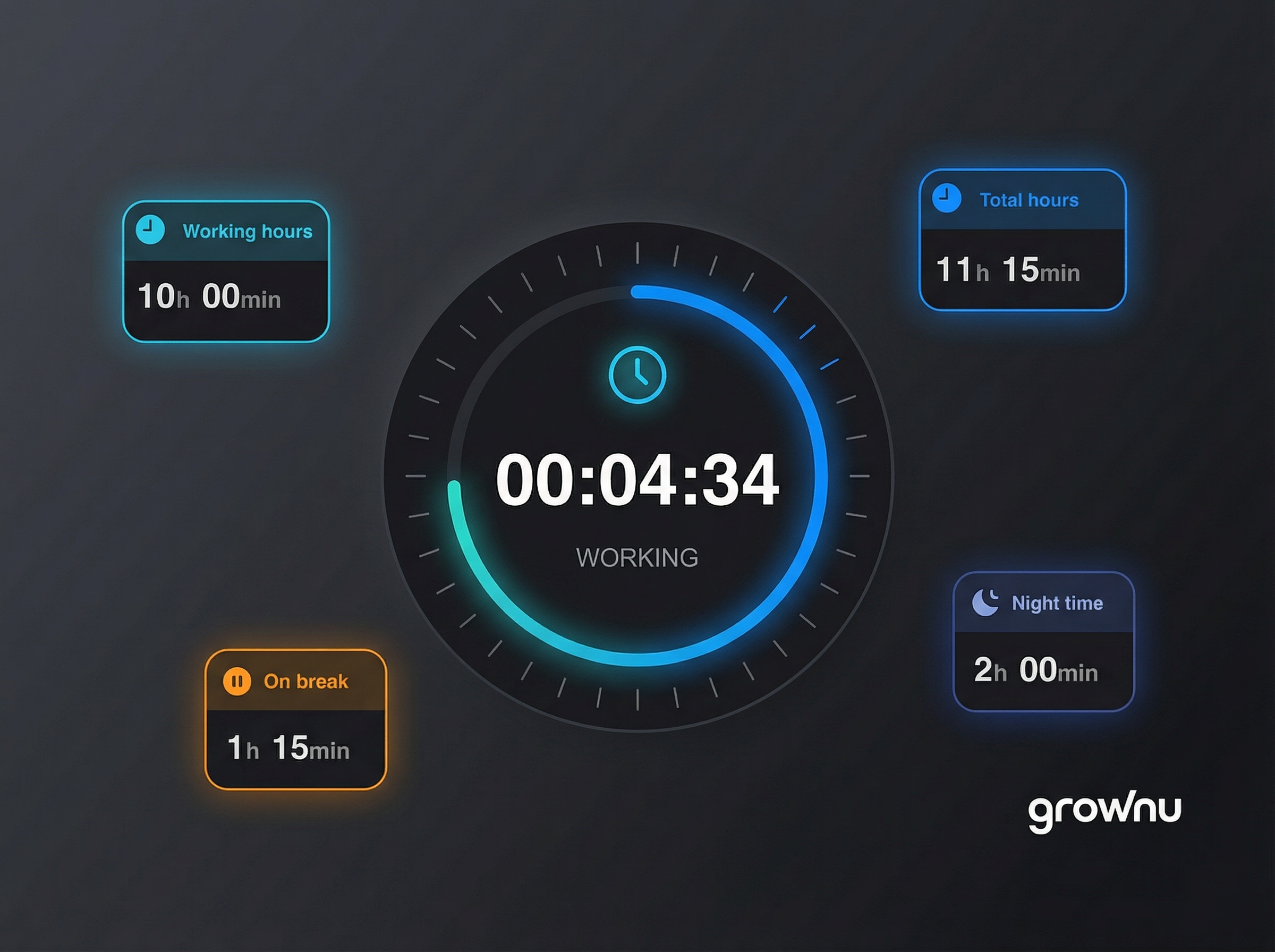Introduction
In the modern world, where time is of the essence and productivity is a priority, understanding the various types of hours that comprise our work schedules is crucial. From the standard working hours that structure our weekdays to the elusive night time hours that challenge our circadian rhythms, each hour type plays a distinct role in shaping our professional lives. Additionally, break hours offer a chance for revitalization, overtime hours demand an extra level of commitment, business trip hours introduce a mix of work and exploration, and bank holiday hours grant us moments of respite. This comprehensive exploration will guide you through the intricacies of time registration and the diverse hour types that shape our daily routines.
If you want the deeper overview, see what work time tracking is and how it supports payroll accuracy.
For an end-to-end setup (scheduling, time & attendance, approvals, and reporting), explore Grownu workforce management solutions.
Outline of the Article
- Time Registration and Different Hour Types
- Hourly Rate Calculations and Rates
- Conclusion
- FAQs - Frequently Asked Questions
Time Registration and Different Hour Types
Effective time registration and a clear understanding of different hour types are essential for optimizing productivity and maintaining a healthy work-life balance. By accurately tracking and managing working hours, break hours, night time hours, overtime hours, business trip hours, and bank holiday hours, individuals and organizations can streamline their schedules, prevent burnout, ensure compliance with labor regulations, and make informed decisions that lead to greater efficiency and well-being.
1. Working Hours
Working hours refer to the regular hours an employee spends performing their job tasks during the standard workday. These hours are typically compensated at the employee's base hourly rate. It's crucial to accurately record working hours to ensure employees receive their rightful pay for the time they invest in their job responsibilities.
2. Break Hours
Break hours are the designated periods during the workday when employees are allowed to take a break from their duties. In most cases, break hours are unpaid, although some jurisdictions mandate paid breaks for specific lengths of time. Accurate time tracking of break hours ensures compliance with labor laws and provides employees with the necessary rest periods. Grownu can automatically apply break deductions based on your organization’s rules, so time entries stay consistent for payroll and reporting.
For on-site teams, time attendance terminals help standardize clock-ins and reduce missed punches.
3. Night Time Hours
Night time hours (night shift hours) usually fall within a defined late-evening to early-morning range based on local rules. Employees working during this period may be entitled to a higher rate (night differential). In Grownu, you can define your night time range so night hours are calculated automatically with the correct rate.
4. Overtime Hours
Overtime hours occur when an employee works more than the standard number of hours defined in their employment contract or labor regulations. Overtime hours are compensated at an overtime rate, which is often 1.5 times the employee's regular hourly rate. Accurate tracking of overtime hours is crucial for ensuring fair compensation and adherence to labor laws.
In workforce software, overtime rules and thresholds can be configured so managers approve exceptions before payroll. See workforce management software.
5. Business Trip Hours
Business trip hours encompass the time an employee spends traveling for work-related purposes, such as meetings, conferences, or client visits. These hours may include travel time, time spent in meetings, and other work-related activities. Compensation for business trip hours might involve a combination of regular and overtime rates, depending on the circumstances and labor regulations.
For mobile and field teams, GPS-based time tracking helps verify locations for travel and on-site work (depending on your policies).
6. Bank or Federal Holiday Hours:
Bank or Federal holiday hours refer to hours worked by employees on public holidays or days when the company is closed. These hours often come with special compensation, such as a higher hourly rate, additional paid time off, or a combination of both. Accurate tracking of bank holiday hours ensures that employees are appropriately compensated for working on holidays.
Hourly Rate Calculations and Rates:
Different types of registered working hours are subject to distinct hourly rate calculations and rates. Regular working hours are typically compensated at the base hourly rate. Overtime hours receive a higher rate, often 1.5 times the regular rate, to incentivize employees to work beyond their standard hours. Night shift differentials and special rates for business trip or bank holiday hours are designed to reflect the additional challenges or inconveniences associated with those times.
The calculation of hourly rates for different work hour types involves various factors, including labor laws, company policies, and collective bargaining agreements. Here are some considerations:
1. Base Hourly Rate:
The standard rate applied to regular working hours.
2. Overtime Rate:
A higher rate applied to hours worked beyond the standard workweek or workday.
3. Night Shift Differential:
An additional percentage applied to night time hours to compensate for the inconvenience of working during non-standard hours.
4. Holiday Pay Rate:
An elevated rate applied to hours worked on bank holidays.
5. Travel Compensation:
Compensation for travel time and work performed during business trips, often subject to negotiation or company policy.
It's important to note that these rates and calculations can vary significantly based on jurisdiction, industry, collective agreements, and employment contracts. Companies must adhere to legal requirements and maintain transparent communication with employees regarding hour types, rates, and calculations to ensure fair compensation.
Conclusion
Effectively managing time registration and different hour types is essential for maintaining a healthy work-life balance and achieving optimal productivity. By understanding the nuances of working hours, break hours, night time hours, overtime hours, business trip hours, and bank holiday hours, you can tailor your approach to each hour type, leading to improved well-being and work outcomes.
Remember, time is a valuable resource, and managing it wisely can significantly impact your personal and professional success.
If you want to manage hour types, rules, and approvals in one workflow, explore Grownu workforce management solutions.
Frequently Asked Questions
Last updated: January 11, 2026

